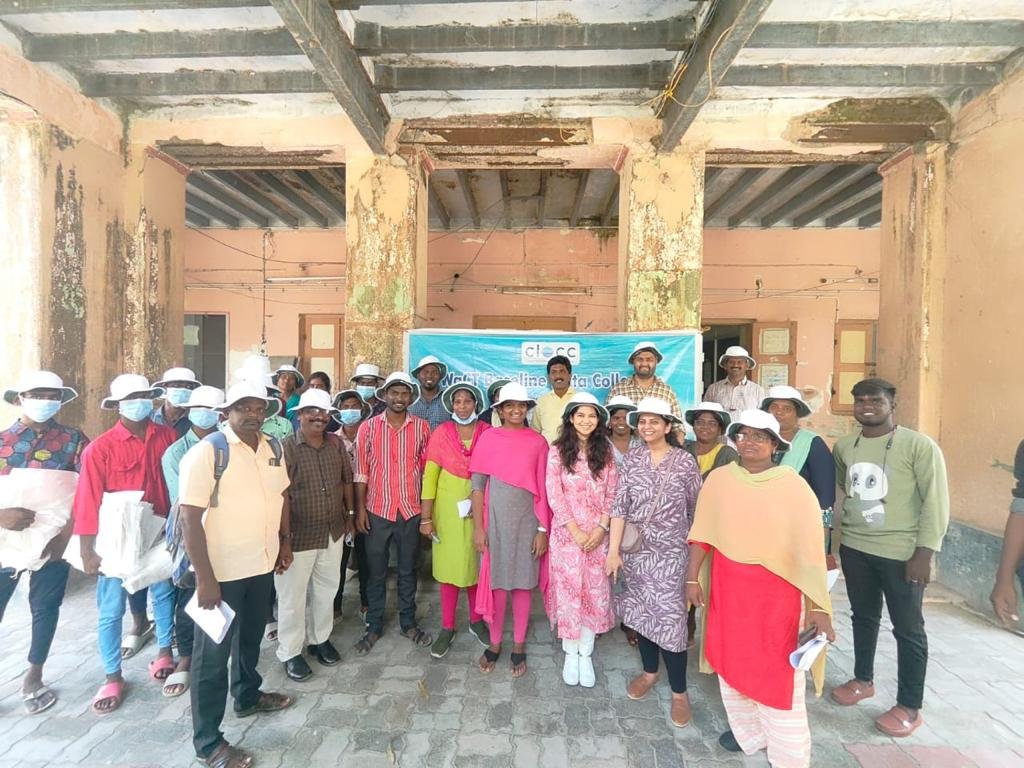Mapping waste flows in Chengalpattu, India
In its India programme, Clean Oceans through Clean Communities (CLOCC) has completed a data collection to map how much waste is generated, waste management and the leakage in Chengalpattu, in India’s Tamil Nadu state.
CLOCC, a community & network-driven programme that aims to improve waste management in communities in Indonesia and India to reduce marine plastic pollution, has since December 2022 started its collaboration with authorities in Chengalpattu. The first steps in creating a sustainable waste management system is mapping the current waste situation and identifying needs for capacity building.
CLOCC is owned by Avfall Norge (Norwegian Waste Management and Recycling Association) with ISWA (International Solid Waste Association) as global implementing partner, and supported by Norad. Their vision is to achieve healthy societies and a clean environment - through inclusive and sustainable communities, green jobs and business opportunities in local circular economies.
Waste mapping using the WaCT process
After a kick-off workshop in December 2022, the CLOCC India team has been working in the Chengalpattu District of Tamil Nadu, with several partners including Hand in Hand India, Hand in Hand Sweden, ISWA’s National Partner in India ICWM, and us, Ambire Global, to create a sustainable waste master plan for the district. The first step in the 7-step participatory planning process is baseline data collection which is being done using UN Habitat’s Waste Wise Cities Tool (WaCT).
On the first day, the team began with a review training with the field team where we discussed the WaCT in detail, and explained the process and steps that we would go through over the next 8 days to colleagues and volunteers. As a Technical Director in ISWA, I am grateful for the presence and support of Ms. Sasikala from the RDMA and Sanitary Inspector Mr. Paul Davis.
The second day began with the detailed labeling and then the distribution of trash bags to the households in the area we planned to analyze. The team also held a workshop on understanding how the team will be organized as the field work progresses. This was followed by a training on waste recovery data mapping. Finally, we all discussed how research should be conducted and the plastic leakage in the district analyzed.
On day three, the team went around to collect the trash bags from all the households and distribute the bags for the next day. All the collected waste was brought to a facility for the waste composition analysis - the waste was weighed, sorted into different categories, and the weights recorded. As per the WaCT methodology, data from day one was discarded.
The team also carried out a hotspot identification exercise, geotagging locations where they saw open dumping, open drains with waste strewn around, or signs of open burning of waste. The team continued to visit recovery and disposal facilities around the district to collect data and map the waste quantities and flows through the system.
The next few days involved a similar process of waste data collection while mapping of recovery facilities and disposal sites took place in parallel. The team and I spent one day at the final disposal site – a dumpsite – where several municipalities and towns are sending their waste. There we sampled waste from nine trucks and also had detailed conversations with the waste workers living and working at the site.
The team also participated in a monthly Peoples Movement for Clean Cities drive in Chengalpattu municipality with the Commissioner Mr. R.Nagerajan and Municipality Chairman Ms. Thenmozhi Narendiran.
The team also had the chance to meet with Chengalpattu District Collector, Mr. A. R. Rahul Nath IAS, who inaugurated the CLOCC India Programme kick-off workshop in December 2022. We updated him about CLOCC’s progress and ongoing activities and he had several insightful inputs and suggestions that the team will take on board. He is eager to see the baseline data collection results and is supportive of an integrated sustainable waste master plan for the district to improve waste and resource management in the region.
Now the first steps of the baseline data collection process have been successfully completed. Next, the data will be analyzed and the waste flows in the district calculated. The draft baseline report and findings will be presented and discussed with all stakeholders during a workshop in the next few weeks before finalization of the baseline report. We're were much looking forward to continuing this journey in Chengalpattu and are so happy and proud to share this project with Ambire Global!
About Ambire Global
Ambire is an innovative venture founded in 2020, providing consulting and digital solutions in sustainable finance, circular economy, and environmental engineering in more than 14 countries. It is headquartered in India and Colombia and is expanding its services globally to support the transition to a fair, equitable, carbon neutral world through efficient and customised solutions.



